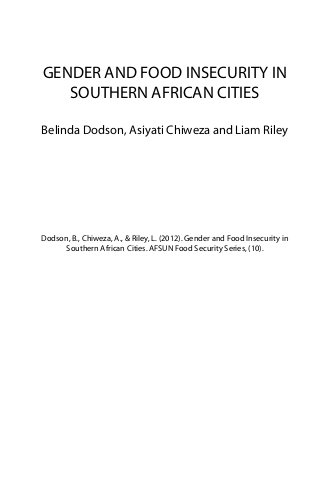Urban Food Security Series | #10

The particular focus of this paper is on the gender dimensions of urban food security that emerge from the AFSUN survey data. The paper begins with a background theoretical discussion of how gender acts as a fundamental determinant of food (in)security, not only in terms of differences between the access to food of individual men and women, but also of gender-differentiated roles and responsibilities in food production, trade, preparation and consumption. This makes gender analysis an important element in understanding not only individual but also household and community food security. The paper then discusses the methodology used in the AFSUN survey and summarizes the overall survey findings, identifying opportunities and constraints for a gender-based analysis. Sub- sequent sections present a gender analysis of the survey data, using both individual and household level data to determine gender-based differences in livelihoods and food security, especially between different household types (i.e. female-centred, male-centred, nuclear and extended). This discussion shows how a gender analysis can shed additional light on the overall survey findings, including explanations for some of the trends and patterns identified.
Links
Resource collections
- Accountability to affected populations (AAP)
- UN Habitat - Urban Response Collection
- Urban Response - Urban Crisis Preparedness and Risk Reduction
- Urban Response Collection - Community Engagement and Social Cohesion
- Urban Response Collection - Economic Recovery
- Urban Response Collection - Environment and Climate Change
- Urban Response Collection - Housing, Land and Property
- Urban Response Collection - Urban Crisis Response, Recovery and Reconstruction
- Urban Response Collection - Urban Resilience